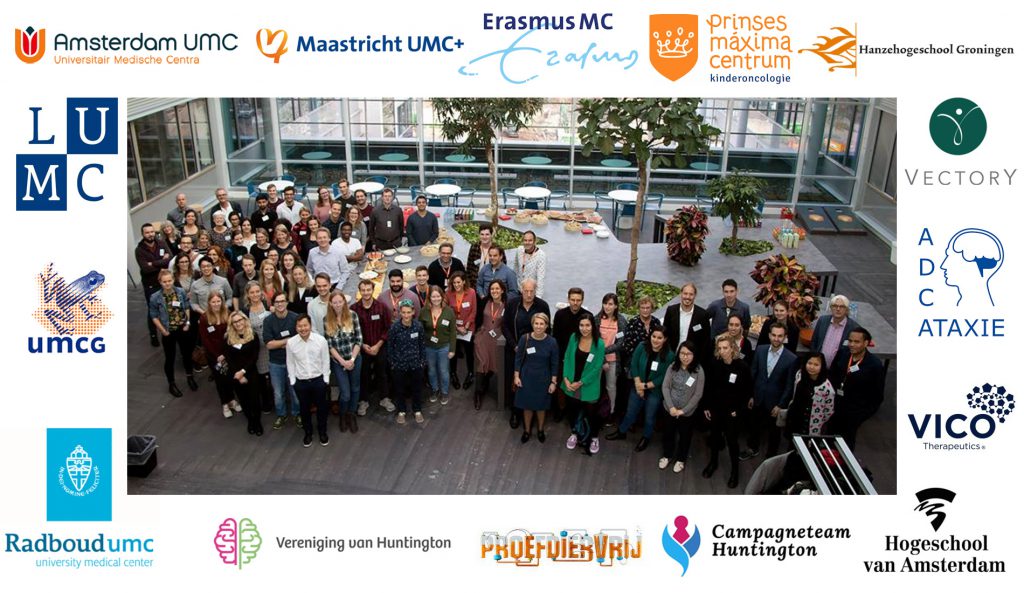ONDERZOEKSSUBSIDIE AANVRAAG 2023 / GRANTS CALL 2023

Campagneteam Huntington – 2023 Call for Grant applications for fundamental research on Huntington’s disease
The Campagneteam Huntington (CTH) awards grants for fundamental scientific research on Huntington’s disease. Researchers are encouraged to use novel, original and challenging approaches that are aimed at finding a therapeutic cure for Huntington’s Disease, focusing on lowering the levels of the mutant huntingtin protein levels (e.g. by reducing mutant HTT synthesis, preventing aggregation or improving turnover). Budget can be requested for salary, equipment and supplies.
Who can apply?
Applications are accepted from scientists employed at Dutch non-profit institutions or universities. Applicants must have expertise relevant for Huntington’s disease research. Junior researchers must be affiliated with a research group with expertise in Huntington’s disease-related research.
Stichting Huntington awards 2 types of grants:
Major grant; a maximum of € 300.000 for 3 to 4 years for a PhD student or postdoc. Applicants for this grant must be a group leader with relevant and proven track record for Huntington-related research.
Pilot grant; a maximum of € 50.000 for 1 year for e.g. a short proof-of-concept study or an extension of a current grant. Junior researchers are specifically encouraged to apply, but alsomore senior researchers can apply.
Procedure
Applications will follow a 2 tier process.
1st tier: Applicants first submit a Letter of Intent (LOI). The Scientific Advisory Board (SAB) will select applications that will be invited to submit a full proposal within a few weeks.
2nd tier: Full proposals will be assessed by external reviewers, the SAB will use the reviews to determine the final ranking and decide on grant awards.
LOIs and full proposals will be ranked based on the scientific merit of the research, the CV of the applicant and on the proposals relevance for finding a cure for Huntington’s Disease. New proposals as well as follow-up proposals can be submitted. In case of equal ranking, follow-up proposals based on previous research funded by CTH are preferred.
Letter of Intent deadline is 15 October 2023
Letters of Intent have to be submitted to opencall@campagneteamhuntington.nl
For questions, please contact opencall@campagneteamhuntington.nl
DHDRN Huntington meeting 2023
The 2023 DHDRN symposium was held on Monday January 23 2023 in Amsterdam organized by the DHDRN board and hosted by uniQure. With about 100 researchers present from universities and UMCs (Amsterdam, Groningen, Leiden, Maastricht, Utrecht and Wageningen), biotech (Prilenia, uniQure, vectorY, VICO) and patient foundations different topics ranging from aggregate formation, altered homeostasis, iPSC models, HTT post-translational modifications to clinical trials, EnrollHD, AI data analysis and biomarkers were presented and discussed
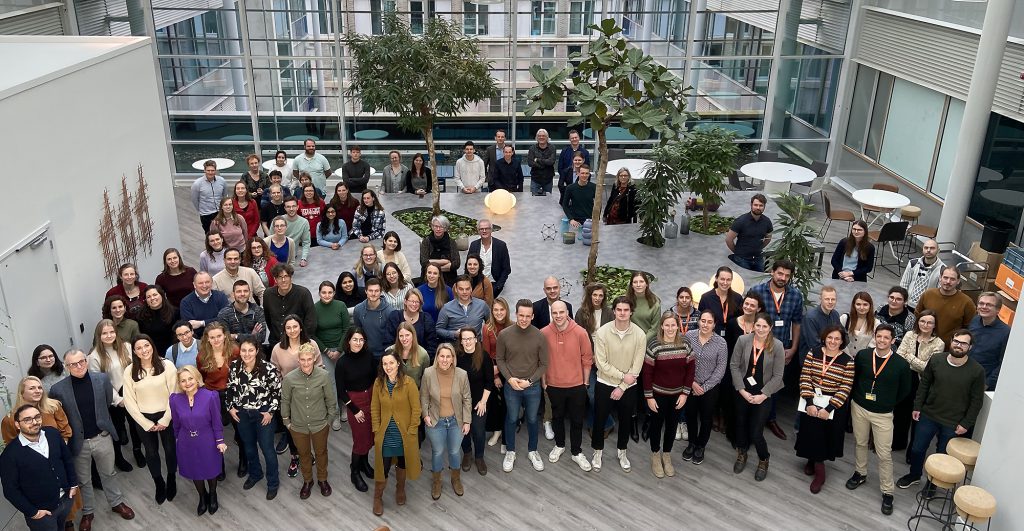
PROGRAM
- 10.30 – 10.45 Welcome: Eric Reits
- 10.45 – 12.30 HF family perspective
- 10.45 – 11.15 Session 1: 6 selected presentations
- 12.30 – 13.45 Lunch and poster session
- 13.45 – 14.30 Key-note speaker
- 14.30 – 15.00 Tea break
- 15.00 – 16.30 Session 2: 6 selected presentations
- 16.30 – 17.00 Poster award: Rob Haselberg
- 17.00 Closing and drinks
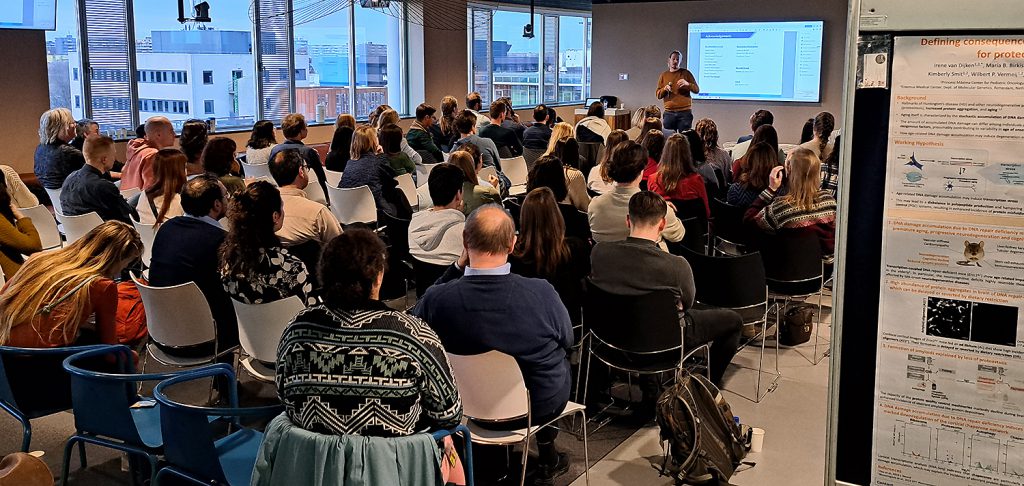
november 2022
5 miljoen voor voorspellen, vertragen en genezen van erfelijke hersenziektes.
Bij verschillende erfelijke hersenziektes beschadigt een gemuteerd eiwit de hersencellen, met achteruitgang van de gezondheid, beperkingen en overlijden tot gevolg. Inmiddels gloort er hoop met experimentele therapieën die de aanmaak of toxische werking van deze eiwitten kunnen remmen. Een consortium van diverse organisaties, waaronder [eigen organisatie], heeft een subsidie van €4,7 miljoen ontvangen van NWO om deze behandeling te onderzoeken en ontwikkelen.

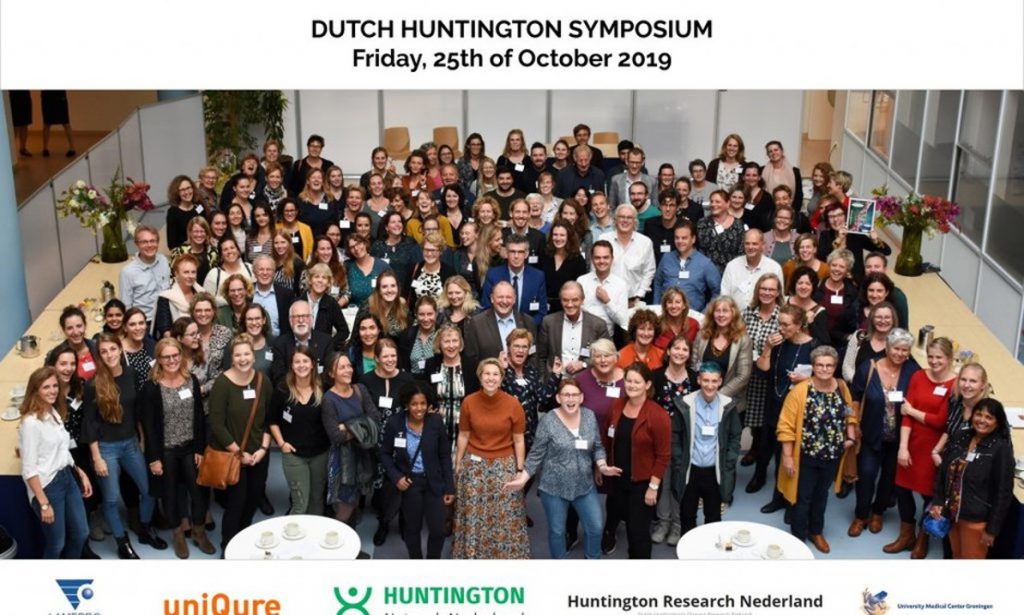
The Dutch Huntington’s Disease Research Network (DHDRN) is a platform for professionals within The Netherlands that facilitates cross-disciplinary discussions and collaborations in worldwide Huntington’s disease research.
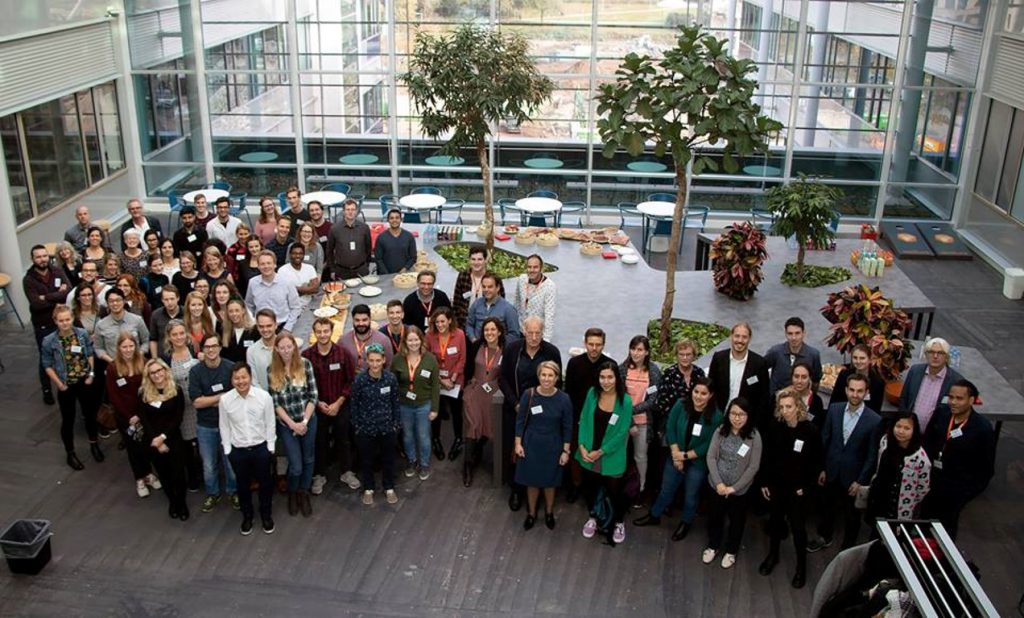
On behalf of the board of the Dutch Huntington Disease Research Network, the 2018 DHDRN symposium was held on
Friday November 9th 2018 Amsterdam
organized by Eric Reits and hosted by uniQure opposite the AMC.
l
All researchers and companies with an interest in Huntington disease are invited to join the network and participate in the yearly meetings.
Annual Meetings: The DHDRN organizes yearly meetings for all researchers and colleagues with oral and poster presentations.
The 2015 meeting on Dutch HD Research was held in Groningen. The 2016 meeting was held in Maastricht. The 2017 meeting was held in Leiden.

2018, Open Call for Grant proposals for research on Huntington’s Disease
The Campagneteam Huntington (CTH) opens a call welcoming grant proposals for fundamental, innovative scientific research on Huntington’s disease (HD). The primary goal of these applications is to further clarify the neurobiological causes and mechanisms of HD. Overarching goals should be to find, accelerate or
develop therapies aimed to prevent, delay or cure HD.
Ideally, focus will be on strategies aimed towards lowering mutant protein levels, e.g. by reducing its synthesis or accelerating its degradation, but topics related to other relevant aspects of (aberrant) protein aggregation will be considered too, provided its relevance for HD is made clear.
Applications are accepted from scientists working at Dutch scientific institutions, hospitals or universities. Applicants must have proven expertise relevant for their planned studies and research experience with neurodegenerative diseases, such as HD. Researchers are encouraged to use novel, original and challenging approaches focusing on disease prevention and/or treatment. Also ‘high risk, high gain’ approaches are allowed as long as the expected benefits and feasibility can be clarified.
Types of grants
Budget can be requested for salary and supplies. CTH awards 2 types of grants;
– Standard grant
a maximum of € 250.000.
This award is intended for a PhD (4 years) or postdoctoral (3 years) position, including bench fee. Overhead will not be funded.
– Pilot grant;
a maximum of € 50.000.
This award is intended for shorter, generally proof-of-concept or pilot studies aimed at addressing a more challenging but potentially promising approach, or for an extension of a current project directly relevant for HD.
Procedure
For the 2018 round, CTH will work with a two-stage procedure; first, a brief Letter of Intent (LOI) is submitted, that will be peer reviewed. A selected number of applicants will be invited to submit a full proposal, which will then be reviewed by the Scientific Advisory Board (SAB) and external experts. Based on these scores, proposals will be ranked and the board of the CTH will then select the awardees.
The LOI consists of 2 pages;
- 1 page A4 with the applicant’s CV, highlighting experience with the proposal plans.
- 1 page A4 total with the grant proposal text. Here, applicants are asked to indicate; ‘standard grant’ or ‘pilot grant’, and provide;
- Title
- 1 paragraph on “Scientific Background and General Objective”,
- 1 paragraph on “Rationale/Specific Aims”,
- 1 paragraph on the Approach and Methods to be used,
- 1 paragraph on “Expected Results and Relevance for HD Prevention or Treatment”, highlighting the deliverables of the research, and explaining how the planned research will benefit our understanding
of HD and in what way it will improve the options towards a cure for HD. - 1 short paragraph on “Budget details”.
When invited to submit a full proposal (max 6 pages including references), applicants are expected to expand on these topics and convince reviewers by describing in more detail their plans, highlighting the relevance and feasibility of the planned research to find a treatment for HD. The full proposal also includes a short Dutch public summary (half A4), a proposed time-table and short budget description. The full proposal form will be sent to the selected applicants.
Grants will be evaluated by the SAB of CTH and by external reviewers. Selection criteria for eligibility include; the scientific merit and promise of the research to help deliver a cure or treatment for HD, the CV of the applicant and the relevance and feasibility of the planned research towards a cure for HD.
Timeline
- Call for proposals opens mid April 2018
- Submission deadline LOI June 1st, 2018
- Pre-selection of LOIs, invitations for full proposal July 1 st, 2018
- Deadline for full proposals 30 September 2018
- Final decision 18 November 2018
- Anticipated start of project January/February 2019
LOIs have to be submitted to: opencall@campagneteamhuntington.nl
Annual Meetings The DHDRN organizes yearly meetings for all researchers and collegues with oral and poster presentations. The 2015 meeting on Dutch HD Research was held in Groningen on September 30. It included also a key note lecture “Protein disaggregation by a human chaperone complex” presented by Nadinath Nillegoda, from the Bukau group. They recently discovered the human disaggregase complex. The 2016 meeting was held in Maastricht with the topic ‘From cell to man’, addressing key questions like “To which extent can clinical questions be translated into preclinical experiments?” and “Can preclinical findings really be used in the clinical arena?”.
Symposium DHDRN (Dutch Huntington Disease Research Network) 2017, Leiden

The 2017 meeting will be in Leiden on November 17th!
Registration will open on Monday September 18th.
On behalf of the board of the Dutch Huntington Disease Research Network, we would like to announce the next DHDRN symposium that will be held in at the LUMC in Leiden on Friday November 17, 2017, organiser Willeke van Roon-Mom (LUMC). Coffee will be ready at 10am and the scientific programme will be from 10.30am till 5pm. We will close the day with drinks and “bitterballen”.
Invited speaker Dr. Sybille Kraus from the German Center for Neurodegenerative Diseases (DZNE) will give a lecture on the involvement of the MID-1 protein complex in sporadic neurodegenerative disorders and Huntington disease. Furthermore, Dr. Ahmad Aziz (LUMC) will give an update on the Phase I Ionis/Roche clinical trial aiming to reduce the production of the huntingtin protein in the brain.
Registration will open on Monday September 18th. Four weeks later we will announce which abstracts have been selected for an oral presentation or poster presentation, and the final programme will be announced.
If you have not received an email regarding this conference, but would like to be included in the mailing list, please send an email to: A.W.Remmelzwaal@lumc.nl
All researchers and companies with an interest in Huntington disease are invited to join the network and participate in the yearly meetings.
Vision The vision of the network is to support and promote excellent scientific Huntington’s disease research in The Netherlands that is aimed at understanding its pathogenesis, find novel druggable targets, and to develop innovative therapeutics to prevent, delay and cure Huntington’s disease.
Mission Create strong partnerships, share knowledge and results, establish international scientific contacts, have continuous interest in Huntington’s disease, work together on research funding.
Goals
- To foster the development of an open collaborative Huntington’s disease research field in The Netherlands.
- To promote collaboration with national and international Huntington researchers and communicate with relevant professional and patient associations.
- To identify and develop opportunities for training of young researcher and exchange of knowledge and expertise.
- To raise the profile of Dutch Huntington’s disease research.
